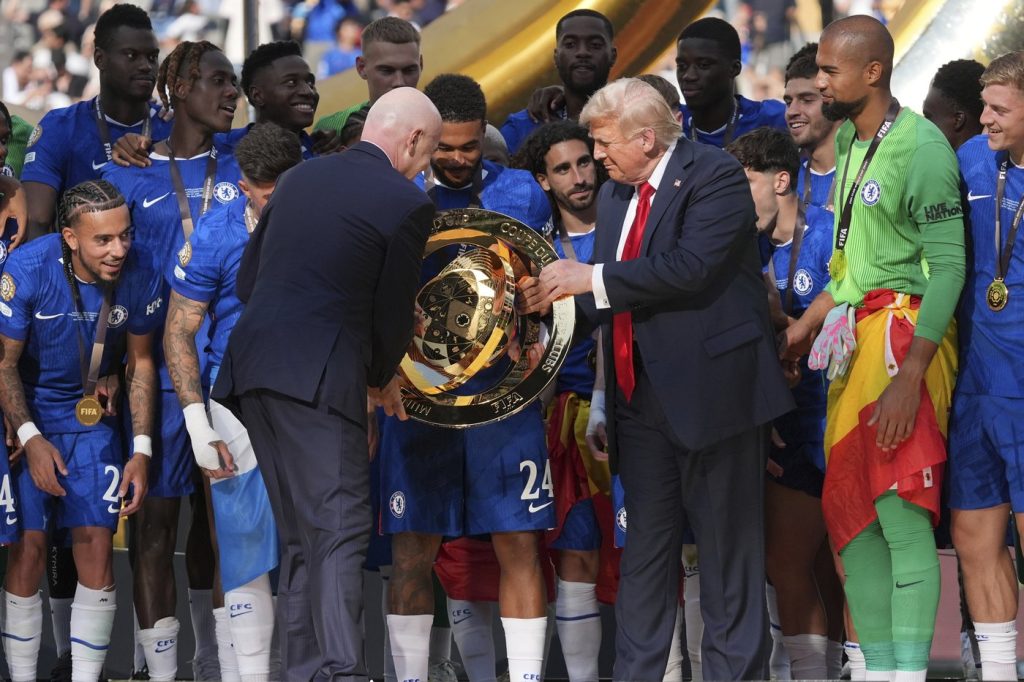OTTAWA — The 2026 FIFA World Cup, set to be co-hosted by Canada, the United States, and Mexico, is facing potential challenges due to escalating political tensions and U.S. immigration policies under President Donald Trump. With less than a year to go until the tournament, which will take place from June 11 to July 19, 2026, supporters are concerned about the implications of U.S. policies on their ability to attend the event.
This year's World Cup will feature a record 48 teams playing a total of 104 matches, with the majority of these matches occurring in the United States. The anticipated influx of millions of fans crossing borders to attend the games raises valid worries, especially in light of Trump's stringent immigration policies, which include travel bans impacting certain countries, aggressive immigration raids, and mass deportations. Victor Matheson, a sports economics professor at the College of the Holy Cross, emphasized, "This is all being driven by the United States. And we’re entirely the guilty party here."
The U.S. currently has travel bans in effect for 12 countries and restrictions for an additional seven, with discussions surrounding potential bans on travelers from yet another 36 nations. Although exemptions exist for athletes and their families, the unpredictable nature of the Trump administration leaves many uncertain about what regulations might exist by the time the tournament arrives. Economist Andrew Zimbalist noted, "I think probably Trump himself might not have the answers because he responds very impetuously to changes in his environment."
Fans from countries affected by Trump's policies may choose to bypass the tournament altogether or opt for matches in Canada, despite the U.S. hosting quarterfinals, semifinals, and the final match. Canadian Heritage estimates that approximately one million international visitors could flood into Canada during the event, indicating a substantial flow of cross-border movement. A spokesperson for the Canada Border Services Agency stated that they are collaborating with other federal departments and FIFA to ensure safety and security during this international event.
Matheson voiced concerns that fans, notably those from countries that face U.S. scrutiny, have legitimate reasons to be anxious about traveling through the U.S. "I would be very concerned about planning a vacation that has you traveling from Mexico or Canada into the United States and back," he said. He warned of the severe consequences that could arise, including the risk of jail time and deportation.
Beyond immigration challenges, Trump's imposition of tariffs on numerous countries, including Canada, may also disrupt World Cup logistics. An example provided by Matheson involves a scenario where a designer of national team jerseys would face difficulties transporting inventory across borders due to these tariffs.
Political scientists like Tim Elcombe, a professor at Wilfrid Laurier University, have noted that while having the Cup hosted jointly by Canada, the U.S., and Mexico was initially perceived as a potential means to ease political tensions, the reality may prove otherwise. Elcombe stated, "the 2026 tournament may be even more politically charged than the 2022 World Cup in Qatar." This dynamic is further complicated by shifting Canadian attitudes towards travel and consumption of American goods amidst rising anti-American sentiment.
Human rights groups have raised alarms regarding Trump's policies, sending a letter to FIFA President Gianni Infantino which highlighted the "serious threat" these policies pose to individuals, particularly non-citizens. This scrutiny is likely to be directed not only at the U.S. but also at Canada, as incidents surrounding Indigenous Peoples' rights may draw critical attention.
MacIntosh Ross, a fellow at the Scott McCain and Leslie McLean Centre, suggested that Canada must exert pressure on the U.S. government to ensure safe conduct during the tournament. He stressed the importance of clearly communicating expectations to U.S. partners involved in hosting the World Cup.
Zimbalist pointed out the unpredictability of Trump's actions, suggesting that political distractions may result in unexpected international decisions as the World Cup approaches. However, he also acknowledged Trump's concern for maintaining a favorable image on the world stage, which could deflect him from imposing overly harsh measures.
As the 2026 FIFA World Cup draws closer, both logistical and political challenges remain paramount, leaving the future of this monumental sporting event uncertain.











